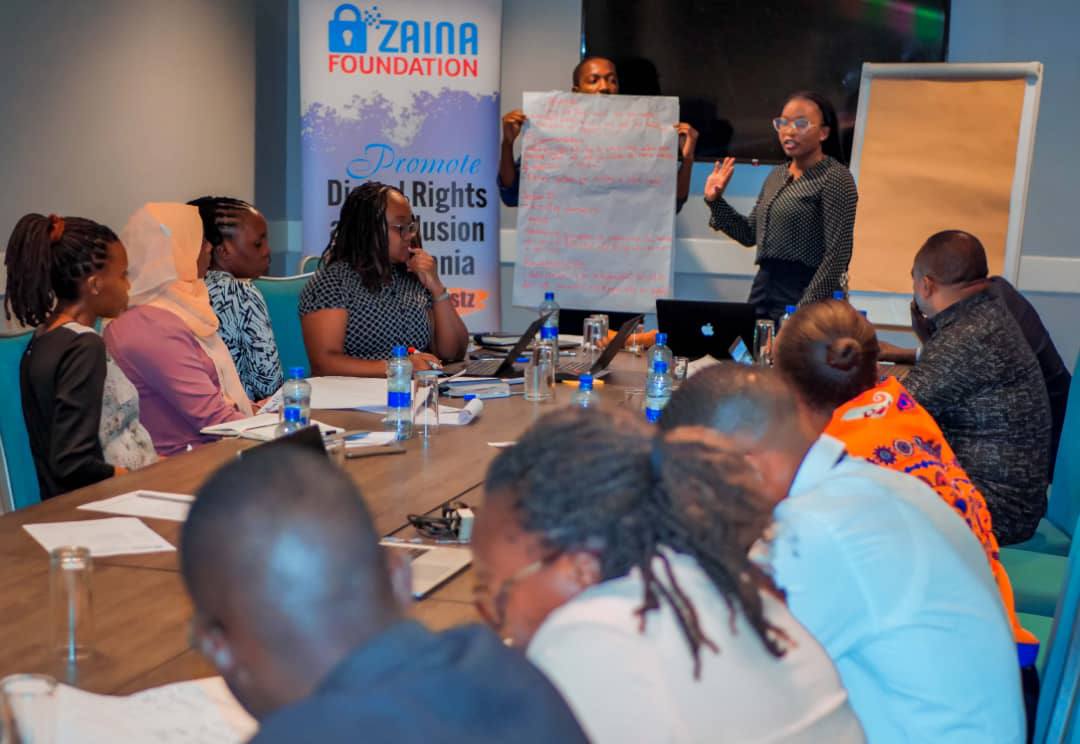Strengthening Media Freedoms: TMC joins Zaina Foundation Review the Media Service Act 2016
As part of and the spirit of the World Press Freedom Day, On 2nd May 2024, among other organizations, Tech & Media Convergency (TMC) was invited to attend a meeting hosted by Zaina Foundation. The event focused on the Media Service Act Advocacy – identifying opportunities for improvement of the the Media Service Act (2016). During the meeting, the working group engaged in discussions and collaborative exercises that aimed at;
- Reviewing key provisions of the Media Service Act and their implications for media freedom and regulation.
- Identifying challenges and gaps in the Act’s implementation and enforcement.
- Exploring opportunities to strengthen media professionalism, ethics, and accountability.
- Formulating actionable recommendations for policy reform and advocacy.
This Media Advocacy strategic meeting came timely, Especially heading towards the by-elections later this year and the general elections of 2025, the Media Service Act is one of the important tools that guide and protect journalists, media houses, and individuals in collecting, covering, and disseminating important information or issues. This law was passed on November 5, 2016, and was assented to by the then President on November 16, 2016. Comprising a total of 8 parts, 67 sections, and 1 schedule, this law is applicable only on the Tanzanian mainland.

A brief Introduction on the Media Service Act
The Media Service Act (2016) was amended in 2023 after a massive pressure from the press and freedom of expression stake holders including: Media Council of Tanzania (MCT), Legal and Human Rights Centre (LHRC), Tanzania Human Rights Defender Coalition (THRDC), Zaina Foundation just to mention a few. In the judgement issued by the East Africa Court of Justice (EACJ) on 28th March 2019 on the Media Council of Tanzania and others v. Attorney General of the United Republic of Tanzania, No2 (2019) a total of 16 sections were rendered violating freedom of expression and therefore called to be amended.
Following this ruling the Media Service Act was amended in 2023 whereby a total of only five (5) sections out of the proposed sixteen (16) sections were amended are as follows:
- Section 5 – deleting paragraph (i) coordinating Government advertisements, -Renaming paragraph (m) and (n)
- Section 38 – Deleting sub section (3) civil or criminal liability for publication of defamatory matters
- Section 50 – Deleting paragraph (a)(ii)- publishing information which are deemed falsified and injurious to a person
- Deleting paragraph (c)(ii)- publishing statements deemed injurious to reputation, rights and freedom of other persons
- Reducing punishment in sub section (1) from fine of Tsh 5 to 20 million or imprisonment of 2 to 5 years or both to a fine of Tsh 3-10 million or imprisonment of 2-5 years or both
- Deleting the word “or” at the end of paragraph (a)(i) and (c)(i)
- Designating the contents of paragraph (a)(i) and (c)(i) as paragraph (a) and (c) respectively
- Reducing punishment in sub section (2) from a fine of Tsh 5-20 million or imprisonment of 3-5 years of both to a fine of Tsh 3-10 million or imprisonment of 2-5 yeas or both
4. Section 51 – reduction of punishment for first offenders in section 51(1) fine Tsh 5-10 million or imprisonment 3-5 years or both to a fine of Tsh 2 – 5 million or imprisonment of 1-3 years or both
- Reduction of punishment to subsequent offenders in section 51 (1) fine Tsh 8-20 million or imprisonment 5-10 years or both to fine Tsh 5-10 million or imprisonment of 1-3 years or both.
5. Section 53- reducing punishment for first time offenders in sub section (1) from a fine of 5-10 million or imprisonment of 3-5 years or both to a fine of Tsh 3-5 million or imprisonment of 1-3 years or both
- Reducing punishment for subsequent offenders in sub section (1) from a fine of 7-20 million or imprisonment of 5-10 years or both to a fine of Tsh 5-10 million or imprisonment 3-5 years or both
- Reducing punishment for first time offenders in sub section (2) from a fine of Tsh 2-5 million or imprisonment of 2-5 years or both to a fine of Tsh 2-3 million or imprisonment of 1-3 years or both
- Reduction of punishment to subsequent offenders in subsection (2) from a fine of Tsh 3-10 million or imprisonment of 3-10 years or both to a fine of Tsh 3-5 million or 3-5 years of imprisonment or both.
Many of these amendments are focused on reduction of punishment (fine and jail time). The eleven (11) remining sections which have not been incorporated in the 2023 amendment (according to the EACJ ruling) are:
- Section 7(3) a,b,c,f,g,h,I,j, section 19, section 20, section 21,section 36, section 37, section 39, section 40, section 52, section 58 and section 59.

Shared Recommendations from the Working Group
- Addition of sub section (4) to section 20 that shall allow people who are not journalists to have freedom of expression in medias and digital platforms
- Availability of an online system that allows issuing of press cards to journalists especially upon expire date of the previous press card. This will reduce costs and make the process much easier and accessible.
- Establishment of a board composed of journalists which will be responsible for hearing appeals from journalists regarding roll and other matters instead of the Minister and after the board has heard the matter in circumstances where the journalist is still aggrieved by the decision then the matter to be tried direct in court of law.
- A section that defines and draws a clear line to what amounts to seditious intention found in section 52. This section is vague to the determinations as to what extent a statement or information can been deemed to fall into seditious intention
- Powers of the Minister as provided in section 59 to be reduced so as to be able to balance and increase freedom of expression in the press and medias without fear of the government officials.
An amended law creates a powerful media coverage which is transparent and free. With the above discussion and recommendations, we are looking forward to a quality amendment of the Media Service Act (2016) that shall be in alignment with freedom of expression in medias, digital platforms and individuals as a whole.

